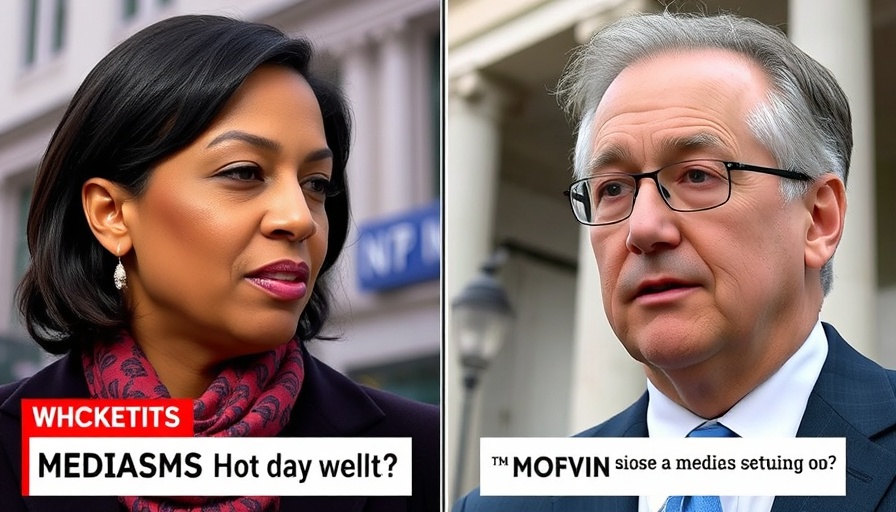
Understanding the Hearing's Context
The recent congressional hearing featuring NPR's CEO Katherine Maher and PBS's president Paula Ker has sparked a significant discussion on media bias and the use of taxpayer dollars. Led by Representative Marjorie Taylor Greene, the hearing sought to scrutinize the editorial decisions made by these publicly funded organizations, questioning their fairness and accountability. Critics have long argued that both NPR and PBS exhibit a left-leaning bias, undermining their responsibility to provide balanced news coverage for all Americans.
In 'Katherine Maher, Head Of NPR, Is Caught LYING During Her Hearing,' the discussion dives into media accountability, exploring key insights that sparked deeper analysis on our end.
The Accusations of Bias
During the hearing, Maher faced tough questions regarding the political makeup of NPR's editorial board, revealing a startling statistic: out of 87 members, not a single Republican is represented. This lack of diversity has raised eyebrows and led to concerns about the organization's ability to deliver impartial news. As Representative Timmons pointed out, how can NPR claim to represent the full spectrum of American society when its decision-makers are overwhelmingly aligned with one political perspective? Maher's admission that this is a concern if true underscores the gravity of the allegations against NPR.
Deflecting Responsibility: Maher's Responses
The hearing continued with further questioning on Maher's past statements and Twitter activity, including her labeling Donald Trump a "fascist" and a "deranged racist sociopath." While she expressed regret, the inconsistency raises questions about her credibility and the accountability of her position as a public figure. When pressed about her historical content, including questionable assertions surrounding race and democracy, Maher's responses were often vague, leading to frustration among committee members who felt she was evading direct answers.
The Broader Implications of Public Funding
Critics assert that organizations like NPR, funded by taxpayer money, should be held to a higher standard regarding political neutrality. The debate touches upon the broader implications of public broadcasting. For many conservatives, the very existence of federally funded outlets poses a fundamental threat to the principles of democracy and freedom of speech. It raises the question: should taxpayer dollars be used to support organizations that may not represent the values and opinions of the populace as a whole?
Comparative Analysis: NPR vs. Private Enterprises
Comparing NPR with private news organizations like The Daily Wire reveals significant distinctions. Unlike NPR, which relies on government funding, The Daily Wire operates within the private sector and focuses on advertising and subscriptions. This model allows for greater accountability and a direct connection to its audience's preferences. Critics argue that if NPR is unable to maintain a diverse and balanced editorial board, it might be time to reconsider its funding sources and operational model.
Public Trust: A Loss or an Opportunity for Improvement?
Erie Berliner, a veteran journalist at NPR, recently indicated in a revealing article that he believed the organization has lost the trust of the public due to its apparent liberal bias. The current congressional hearings might signify not just a crisis of confidence but also an opportunity for these organizations to evaluate their practices and restore trust among listeners. Public opinion matters, and accountability is vital to repair the damage and regain the confidence of all Americans.
Looking Ahead: Recommendations for the Future
The careful analysis presented during these hearings could pave the way for future reforms. Increasing transparency, diversifying editorial boards, and ensuring balanced reporting can begin to address the gaps in representation that many Americans find concerning. Public trust can be rebuilt if organizations like NPR commit to openly acknowledging their biases and actively working to rectify them.
Final Thoughts: What's Next?
As media consumers, it’s essential for audiences to engage critically with the news they consume, questioning biases and demands for accountability from publicly funded entities. The conversation initiated in this congressional hearing represents a pivotal moment to reform and reestablish the role of public media in a democratic society.
If you believe in the importance of a balanced media landscape, consider supporting movements and discussions that promote accountability and transparency in public broadcasting. Together, we can contribute to a future where all voices are heard, and democracy thrives.
 Add Row
Add Row  Add
Add 




Write A Comment